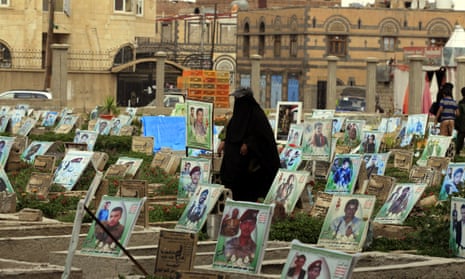The Trump administration has given details of a UN-brokered peace plan aimed at ending the war in Yemen, beginning with a ceasefire within 30 days and talks to be held in Sweden.
The US defence secretary, James Mattis, told an audience in Washington that Saudi Arabia and its Emirati allies were ready for a deal and that the talks between the Saudi-led coalition and the Houthi rebels were being arranged by the United Nations special envoy, Martin Griffiths.
The secretary of state, Mike Pompeo, issued a statement about three hours later, proposing specific terms for a ceasefire.
“The time is now for the cessation of hostilities, including missile and UAV strikes from Houthi-controlled areas into the Kingdom of Saudi Arabia and the United Arab Emirates (UAE). Subsequently, coalition air strikes must cease in all populated areas in Yemen,” Pompeo said.
“Substantive consultations under the UN special envoy must commence this November in a third country to implement confidence-building measures to address the underlying issues of the conflict, the demilitarisation of borders, and the concentration of all large weapons under international observation,” the secretary of state added.
Pompeo did not name the venue for the talks, but Mattis said it would be Sweden. On Wednesday the Swedish foreign minister, Margot Wallström, confirmed that the UN had asked whether the country could provide a venue for talks that it would be happy to act as host.
The announcement does not seem to have been coordinated with Stockholm or with other allies. A western diplomat said it did not even seem to have been cleared with the Saudis or Emiratis. The fact that the secretary of state issued a late-night statement shortly after the defence secretary, with fewer details, also raised the possibility that Mattis had not coordinated his disclosures with others in the administration.
Jeremy Hunt, the UK foreign secretary, said Britain was strongly supportive of the US plan and that it had the potential to open up a humanitarian corridor into the country. He denied the UK had been caught out by the US announcement even though Alistair Burt, his Middle East minister, had appeared to reject any ceasefire in evidence to MPs on Tuesday. Hunt said Burt has been rejecting a formal ceasefire, not a cessation of hostilities – the language used in the US statement.
Hunt said the Saudi admission of the murder of Jamal Khashoggi in its Istanbul consulate may have created a diplomatic opportunity and “any opportunity we have to get movement on the Saudi side or the Houthi side is something we would want to exploit”.
The announcement came as fears rose of a new offensive by the Saudi-led coalition in the coming days on the port city of Hodeidah, where there is a reported build-up of thousands of coalition troops.
Talks planned in Geneva in September failed to take place, as Houthi representatives refused to attend without guarantees of safe passage for their wounded soldiers. The two sides have not held talks for two years.
Western diplomats said that until very recently the UAE had been resisting some of the proposed ceasefire terms but had softened its position in the past few days.
The three-year conflict has taken more than 10,000 lives and efforts by Saudi Arabia and the United Arab Emirates to strangle the economy in Houthi-run areas threaten to help trigger a famine, which the UN says could be the worst the world has seen for a hundred years.
“Thirty days from now, we want to see everybody around a peace table, based on a ceasefire, based on a pullback from the border,” Mattis said during an appearance at the US Institute of Peace. “That will allow the special envoy, Martin Griffiths, who is very good, who knows what he’s doing, to get them together in Sweden. That is the only way we are going to solve this.”
Griffiths, a veteran British mediator, issued a statement welcoming the US announcement and urged the implementation of confidence-building steps strengthening the Yemen central bank, the exchange of prisoners and the reopening of Sana’a airport.
“We remain committed to bring the Yemeni parties to the negotiations table within a month,” he said.
The former head of US disaster relief assistance, Jeremy Konyndyk, suggested the Trump administration was beginning to panic about what could happen in Yemen, and the growing congressional opposition to US backing for the Saudi coalition, especially after Khashoggi’s murder.
“UN envoy Martin Griffiths was in DC last week and his briefings must have turned some heads,” Konyndyk said in a series of tweets. “No administration wants a famine on its watch – and particularly one that would be so closely tied to the White House’s Saudi policy.”
David Miliband, chairman of the International Rescue Committee and former UK foreign secretary, called on other security council members to back what may lead to the most significant breakthrough in four years. He said: “The UK and other members of the UN security council should be ashamed at their silence in backing the US move.”
The US, along with the UK and France, supplies most of the coalition’s weaponry, but has refused to curb the flow of arms in the face of high numbers of civilian casualties and the coalition’s blockade on Houthi areas, where most of the population live.
